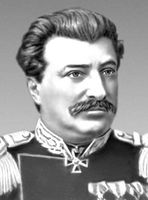Nikolay Przhevalsky

Nikolai Mikhaylovich Przhevalsky (IPA: [prʐɛ'valʲskʲi]), also spelled Przewalski and Prjevalsky (Russian: Никола́й Миха́йлович Пржева́льский; April 12 [O.S. 31 March] 1839—November 1 [O.S. 20 October] 1888 ), was a Russian geographer and explorer of Central and Eastern Asia. Although he never reached his final goal, Lhasa in Tibet, he traveled through regions unknown to the west, such as northern Tibet, modern Qinghai and Dzungaria.[1] He significantly contributed to European knowledge on Central Asia and was the first known European to describe the only extant species of wild horse.[2]
Biography
Przhevalsky was born in Smolensk into a noble Polish family (hence the Polish spelling of his name: Przewalski), and studied there and at the military academy in St. Petersburg. In 1864, he became a geography teacher at the military school in Warsaw.
In 1867, Przhevalsky petitioned the Russian Geographical Society to be dispatched to Irkutsk in Eastern Siberia. His intention was to explore the basin of the Ussuri River, a tributary of the Amur. This was his first expedition of importance; it lasted two years. Przhevalsky published the diary of the expedition as "Travels in the Ussuri Region, 1867-69."
In the following years he made four journeys to Central Asia:
- 1870–1873 from Kyakhta he crossed the Gobi desert to Peking, then exploring the upper Yangtze (Chang Jiang), and in 1872 crossing into Tibet. He surveyed over 7,000 square miles, collected and brought back with him 5,000 plant, 1000 bird, and 3,000 insect species, as well as 70 reptiles and the skins of 130 different mammals.[3]
- 1876–1877 travelling through Eastern Turkestan he visited what he believed to be lake Lop Nor, which had reportedly not been visited by any European since Marco Polo. [4]
- 1879–1880 via Hami and through the Qaidam basin to lake Koko Nor. Then over the Tian Shan mountains into Tibet to within 260 km of Lhasa before being turned back by Tibetan officials;
- 1883–1885 from Kyakhta across the Gobi to Alashan and the eastern Tian Shan mountains, turning back at the Yangtze. Then back to Koko Nor, and westwards to Khotan and Lake Issyk Kul.
The results of these expanded journeys opened a new era for the study of geography in Europe as well as the studies of the fauna and flora of this area that was relatively unknown to his Western contemporaries. Among other things, he reported on the wild population of Bactrian Camels as well as the Przewalski's Horse and Przewalski's Gazelle named after him in many European languages. Przhevalsky's writings include Mongolia, the Tangut Country (1875) and From Kulja, Across the Tian Shan to Lob-Nor (1879).
Przhevalsky died of typhus during his fifth journey at Karakol on the shore of lake Issyk-Kul in present day Kyrgyzstan. The Tsar immediately changed the name of the town to Przhevalsk. There are monuments to him there and in St. Petersburg.
Less than a year after his death, Nikolay Yadrintsev (who succeeded Przhevalsky at the head of his expedition) discovered the remains of Genghis Khan's capital Karakorum. Przhevalsky's work was continued by his young disciple Pyotr Kuzmich Kozlov, described as "the young man who had been eluding [Przevalsky] all his life: alert, submissive, loyal, and handsome".[5]

Imperialism
According to David Schimmelpenninck Van Der Oye's assessment, Przhevalsky's books on Central Asia feature his disdain for the Oriental - particularly, the Chinese - civilization. Przhevalsky supposedly portrayed the Chinese as cowardly and lazy, and in all respects inferior to the "European civilization".[6] He purportedly argued that Imperial China's hold of its northern territories, in particular Xinjiang and Mongolia, was very weak and uncertain, and openly called for Russia's annexation of bits and pieces of China's territory.[7]
Urban legends
There is an urban legend that Joseph Stalin was an illegitimate son of Nikolai Przhevalski [8] [9]. The legend is supported by the similar appearance of both men, probably exaggerated by the propaganda efforts to make canonical images of Stalin more Slavic-like[10] . On the other hand, Przhevalsky has not been known to have dated a woman and was described by his biographers as essentially asexual.[5] His visits to Georgia are not recorded, either. The humoristically developed version of this legend appears in book 3 of Vladimir Voinovich - "The Life and Extraordinary Adventures of Private Ivan Chonkin".
References
- ^ Luce Boulnois, Silk Road: Monks, Warriors & Merchants, 2005, Odyssey Books, p. 415 ISBN 962-217-721-2
- ^ Hellemans, Alexander; Bunch, Bryan (1988). The Timetables of Science. Simon & Schuster. p. 304. ISBN 0671621300.
- ^ Wood, Francis (2002). The Silk Road: Two Thousand Years in the Heart of Asia. Berkeley, CA: University of California Press. pp. 165–169. ISBN 978-0-520-24340-8.
- ^ Author August Strindberg, however, believed that Przhevalsky was preceded by Johan Gustaf Renat by almost two centuries. See August Strindberg, "En svensk karta över Lop-nor och Tarimbäckenet" (in Swedish)
- ^ a b Robert F. Aldrich. Colonialism and Homosexuality. Routledge, 2003. ISBN 0415196159. Page 36.
- ^ See, e.g. Nikolai Przhevalskii, "Mongolia, The Tangut Country and the Solitudes of Northern Tibet", two volumes, translated by E. Delmar Morgan with introduction and notes by Colonel Henry Yule (London: Sampson Low, Marston, Searle & Rivington, 1876, vol. 2, p. 24.
- ^ David Schimmelpenninck Van Der Oye, "Toward the Rising Sun: Russian Ideologies of Empire and the Path to War with Japan" (DeKalb, Il: Northern Illinois University Press, 2001), p. 34
- ^ Alexander Portnov Great pseudonym of Joseph Przhevalsky Template:Ru icon
- ^ Thoughts after the exhibition or who are you, Joseph Stalin
- ^ S.V. Anuchkov Stalin, Mustache of Przhevalsky and Great Duchess Anastasia Template:Ru icon
External links
- Kyrill Kunakhovich, "Nikolai Mikhailovich Przhevalsky and the Politics of Russian Imperialism", in "IDP News", Issue No. 27 (accessed 2007-01-31)
